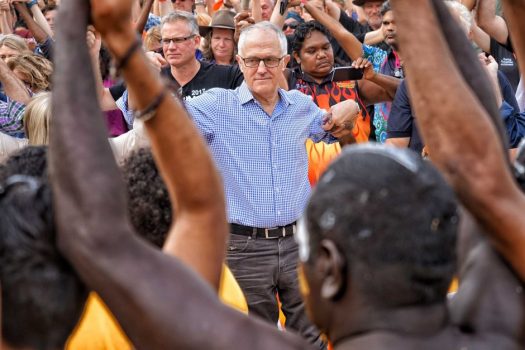Renewed hope at Garma Festival

Part Sixteen of a history of European occupation, rule, and brutal imperialism of Indigenous Australia, by Dr George Venturini.
Renewed hope at Garma Festival
Indigenous leaders attending the Garma Festival 2017, which ran from 4 to 7 August, was called to celebrates Yolngu cultural inheritance in Arnhem Land, Northern Territory, and was presented by the Yothu Yindi Foundation, said that they were more optimistic than ever that Australians will embrace the idea to hold a referendum to establish an Indigenous ‘Voice’ to Parliament. They had travelled to the Festival to speak about the Uluru Statement and constitutional recognition.
The opening ceremony was filled with hope for action on reconciliation.
A special A.B.C. Q&A panel addressed issues of constitutional reform, social inequality and language preservation.
Cape York Partnership founder Mr Noel Pearson said that he believed decisions concerning a referendum and a treaty would be made within the next three to five years.
However, the Indigenous Affairs Minister Nigel Scullion said that ‘fear of the unknown’ was driving resistance to the idea, proposed at Uluru. He urged detractors to take a ‘chill pill’ – in English: something which calms nerves or induces relaxation. “We need to, in a careful way, consider this,” Senator Scullion said. “There are so many ways this can get off the rails.”
University of Melbourne Professor Marcia Langton said she expected some politicians would prefer to deal with other matters requiring amendments to the Constitution before they dealt with Indigenous recognition.
Speaking on 5 August 2017 the Leader of the Opposition, Bill Shorten told the Garma audience that Labor would support a referendum on a ‘Voice’ to Parliament, while Prime Minister Malcolm Turnbull said the question needed more consideration.
The Festival Chief Executive Officer, Mrs Denise Bowden warned that the issue should not be used as a “political football.” “This is a very sensitive discussion, a very sensible discussion,” she said.
Asked about the preservation of endangered Indigenous languages, Ms Djapirri Munungirritj of the Yothu Yindi Foundation’s said that she was heartened to hear Mr Turnbull speak Yolngu Matha, the language familiar to most Indigenous People, at Garma. “I was pretty amazed,” she said. “In amongst the audience [there were people] that say ‘I wish I knew how to speak Yolngu Matha’.”
She also said that she wished to see a process of truth-telling in Australia about the Frontier Wars and the dispossession of Indigenous and Torres Strait Islander Peoples. She expressed her hope thus: “I know it’s painful to talk about it today, but we as people can resolve what has been in the past so that when we do that our younger generation can prosper and see a great future.” (Garma 2017: Indigenous leaders hope ‘voice to parliament’ referendum not far off, The A.B.C.).
Less optimistic was Ms Pat Anderson, the former chairwoman of the Referendum Council. She said that she was “distressed” and “deflated” by the Prime Minister and Opposition Leader’s “disrespectful” behaviour at the Festival.
“They will do anything and everything except talk to us,” she said.
The previous month the Council had delivered its report recommending a referendum be held to establish a First Nations assembly to advise the Federal Parliament.
Prime Minister Turnbull did not commit to action on any of the Referendum Council’s recommendations of a treaty, a constitutionally enshrined ‘Voice’ for Indigenous People in Parliament, or a truth-telling commission.
Mr Turnbull said he had learned from his involvement in the failed 1999 referendum on whether to make Australia a republic.
“Many people talk about referendums, but few people have knowledge in running one,” he said. “An all-or-nothing approach often results in nothing.” … “I respect deeply the work of the Referendum Council, and I respect it by considering [their report] very carefully.”
Mr Turnbull said that he accepted that many people involved in the Referendum Council’s process wanted to see their recommendations implemented immediately, but urged for a careful consideration of how exactly they would be rolled out.
Mr Turnbull said that the recommendations of the Referendum Council were being considered by Cabinet, and the final approach would have to be bipartisan in order to succeed.
“That’s our way,” he said. “That’s how we give respect to serious matters.”
The Prime Minister said that he looked forward to understanding “what Makarrata means.”
“We know that from little things big things grow,” he said.
The Leader of the Opposition, Bill Shorten followed the Prime Minister’s speech, and said that the Uluru Statement from the Heart had articulated old ideas for a new generation. He said that he would carefully consider the call for a constitutionally-enshrined Indigenous ‘Voice’ to Parliament. In his view, Labor was “not confronted by the notion of treaties with our first Australians.” Mr Shorten said that agreeing on a referendum question should be the very next step and there was “no reason why that can’t be done by the end of this year.” “The Parliament could agree on the question by the end of this year, with the referendum to follow soon after that,” he said.
Mr Shorten later met with Indigenous leaders, including Referendum Council members Pat Anderson, Megan Davis and Noel Pearson, to assure them that a Labor government would implement the Council’s full recommendations. “They wanted to know that Labor was supportive of enshrining a voice for our first Australians in the constitution, I said we were,” he said.
He said that he was committed to delivering a referendum but also working with the Prime Minister for a bipartisan resolution.
“We are up for negotiation, compromise and debate, but the fundamental presumption is that we should have a process in this country where decisions that are made which affect Aboriginal and Torres Strait Islanders are made with them not without them.”
“I understand that people feel politics has failed them and I think people have the right to be cynical, disappointed and perhaps frustrated with the lack of progress in the past,” he said.
The leaders’ speeches followed a rare address by the land rights champion Dr Galarrwuy Yunupingu who cautioned politicians that Indigenous People expected they would come to Garma for “serious business” … “We live side by side, but not yet united.” Dr Yunupingu said. “We trust the Prime Minister to put the Makarrata to the Government.” He received a standing ovation.
Ms Anderson said she was deeply disappointed neither Mr Turnbull nor Mr Shorten had accepted the Uluru Statement’s recommendations.
“We have nothing more to give you,” she said. “We give you a ceremony, and our leaders didn’t get it, they can just stand here and give empty platitudes.”
During the week Mr Shorten had written to the Prime Minister suggesting that a joint parliamentary committee be established to finalise a referendum question.
But Ms Anderson said that was unnecessary.
“We need another committee like a hole in the head,” she said. “We’re living in a Monty Python – a well-known British surreal comedy. And for good measure she added: “They didn’t respond to the expert panel [on constitutional recognition], they didn’t respond to the parliamentary committee.”
To all that Mr. Pearson contributed, clearly, that an Indigenous representative body could be a “persistent and belligerent voice” to advocate for First Nations People. “This is our country; we want to have a say,” he said.
“We’ve had a failure of leadership so far. We’ve got to get organised and we can’t yield to poor leadership.”
Referendum Council member Professor Megan Davis, who had devoted six months to consulting with Indigenous People in every state and territory earlier in 2017, added: “What we did hear at the dialogues is that people have had enough.” … “People said that bureaucrats in Canberra control their lives. If we have another select committee [on constitutional recognition] that will be five committees in five years.”
Professor Davis said that the Uluru Statement would be the last attempt for meaningful change for Indigenous People. She said that the Referendum Council refused to give a hard copy of the statement to politicians because they feared it would sit in Parliament as a framed piece of paper that achieved no change.
“The only way we can get this done is to get all Australians to walk with us,” she said.
“People feel like it’s the last throw of the dice – so it has to be.” (Garma Festival: Turnbull, Shorten criticised for ‘Empty platitudes’ over Indigenous recognition, The A.B.C.).
Many had expected Prime Minister Turnbull to respond more strongly than he did to the Referendum Council’s report released on 30 June 2017. Nevertheless, Indigenous leaders urged their people not to be discouraged by the Government’s lack of action. (Garma: Indigenous leaders tell audiences not to lose hope in wake of PM’s address, The A.B.C.).
Continued Friday with: The dangers of appeasement (Part 1)
Previous instalment: The Uluru gathering (Part 3)
 Dr. Venturino Giorgio (George) Venturini, formerly an avvocato at the Court of Appeal of Bologna, devoted some sixty years to study, practice, teach, write and administer law at different places in four continents.
Dr. Venturino Giorgio (George) Venturini, formerly an avvocato at the Court of Appeal of Bologna, devoted some sixty years to study, practice, teach, write and administer law at different places in four continents.
Like what we do at The AIMN?
You’ll like it even more knowing that your donation will help us to keep up the good fight.
Chuck in a few bucks and see just how far it goes!
Your contribution to help with the running costs of this site will be gratefully accepted.
You can donate through PayPal or credit card via the button below, or donate via bank transfer: BSB: 062500; A/c no: 10495969









